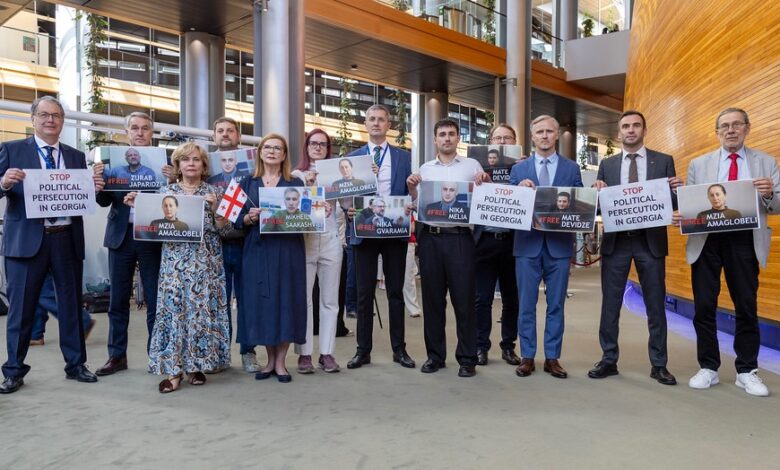
European Parliament Debates Media Freedom in Georgia, Detained Journalist Mzia Amaghlobeli
On June 18, Members of the European Parliament debated media freedom in Georgia, focusing in particular on the case of Mzia Amaghlobeli, the detained journalist and founder of the Batumelebi and Netgazeti news outlets.
Seven motions were submitted for a vote for the adoption of a resolution the next day, June 19. Most of the notions call for Amaghlobeli’s release, among other demands.
“Journalist Mzia Amaghlobeli has become a symbol of all Georgians imprisoned by the Bidzina Ivanishvili regime,” said Lithuanian MEP Rasa Juknevičienė. A vocal critic of Georgian Dream, Juknevičienė warned fellow lawmakers that the situation in Georgia “is getting worse every day.”
“We need to talk about us, the EU,” Juknevičienė continued. “I do not understand the silence from the European Council, the Member States, and the High Representative’s Office,” she said, calling for “serious sanctions against the regime” and increased pressure on Georgian authorities, rather than continuing to appeal to Georgian Dream to return to the European path.
“They will not return, because the regime is the Kremlin’s dream,” Juknevičienė said. “Let’s act. The people of Georgia cannot be left alone.”
“The ruling Georgian Dream party fears the free press like a vampire fears the light because they know that they can only survive in the shadow,” said German MEP Tobias Cremer of the S&P group. “We can only appeal to the Georgian authorities to step out of the shadows, drop the politically motivated charges, and let the Georgian people choose their future freely in the light,” he added, slamming Georgian Dream and its founder and honorary chair, “oligarch” Bidzina Ivanishvili.
Polish MEP Małgorzata Gosiewska of the European Conservatives and Reformists group said Mzia Amaghlobeli was arrested “solely because she had the courage to protest.” Warning that “in Georgia, the lights of democracy are going out,” she cited the brutal crackdown on protests and what she called the GD’s “open war with free media.”
The MEP concluded, “We cannot just stand by and watch…Submitting to dictatorship is a crime. Silence and just standing by is also a crime.”
Another Lithuanian MEP, Dainius Žalimas of the Renew Europe group, echoed the need for EU-level measures against the Georgian Dream authorities.
“Only a few member states have imposed sanctions,” he noted. “The EU seems to be treating Georgia as a lost country,” which he called a “big mistake.”
He added, “The Georgian civil society continues to fight… We cannot abandon them if we really seek to support democracy.”
Austrian MEP Lena Schilling, a member of the Greens/European Free Alliance, said Mzia Amaghlobeli’s arrest is “clearly political” and based on “fabricated charges.” Schilling, who attended one of Amaghlobeli’s trials in Georgia, said pointedly, “Her case is a direct attack on press freedom.”
“Supporting Mzia means standing for a free, democratic, and European Georgia,” she concluded, “and we need to step up here to support her and all the people in Georgia.”
A different stance was voiced by German MEP Petr Bystron of the far-right Europe of Sovereign Nations group.
“Please support reporters,” Bystron told fellow lawmakers. “Don’t support NGOs abroad that only want a regime change.”
Another Lithuanian MEP, Liudas Mažylis of the European People’s Party (EPP), said the GD authorities’ “anti-democratic treatment” of citizens, including media and civil society representatives, is a “copy-paste model used by Belarus and Russia, and most probably directly inspired by Russia.”
He said Georgia shows a “clear mark” of authoritarianism and warned, “Before the total institutional collapse in Georgia, we must increase pressure on those who are gradually consolidating it,” specifically calling for targeted sanctions.
Spanish MEP Nacho Sanchez Amor of the Socialists and Democrats group slammed the Georgian Dream’s “deep state” conspiracy, stating, “Anything that annoys the [GD] government is a ‘deep state.’”
He said the EU needs to ensure the presence of “true” journalism in the country, produced by professional journalists like Mzia Amaghlobeli.
“It’s the only way to counter these fantasies of the authoritarian regimes,” he added.
Unlike most other speakers in the debate, Thierry Mariani, a French MEP from the Patriots for Europe group, appeared to voice GD-preferred messages. He criticized the EU’s “obsession” with Georgia and accused Brussels of trying to overthrow the government in Tbilisi.
He claimed that NGOs “financed by external interests” are working to destabilize the country.
“Georgians don’t need anyone interfering, whether from Moscow or Brussels,” he said.
The debates were concluded by Ekaterina Zaharieva, European Commissioner for Startups, Research, and Innovation, who condemned Amaghlobeli’s imprisonment, saying it was “for her commitment to truth and justice.”
“Her case is emblematic of the shrinking space for free expression,” she said, adding that this is unacceptable in a country “aspiring to join the EU.” She called for Amaghlobeli’s release.
Concurrently with the debates in Strasbourg, the Batumi City Court fined Mzia Amaghlobeli GEL 1,000 (about USD 370) over an incident for which she had already been fined earlier – placing a protest sticker on an outbuilding of the Batumi Police Department, just hours before her second arrest on the night of January 11.
Also Read:
- 28/05/2025 – Journalists Launch Movement Demanding Release of Mzia Amaghlobeli
- 16/05/2025 – MEP Attends Mzia Amaghlobeli Court Hearing in Batumi, Says “Europe is Watching”
- 18/03/2025 – Clooney Foundation to Monitor Mzia Amaghlobeli’s Trial
This post is also available in: ქართული